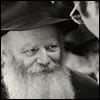Preparation to Visit 770 for Simchat Torah
We decided this year to visit the Rebbe for the last days of Sukkot and Simchat Torah. This would be the first time that we would have the pleasure of spending these holidays with the Rebbe, and we were looking forward to some new experiences.
On the fourth day of Sukkot, while still in Manchester, I wrote the following letter to the Rebbe, which I intended to take with me and deliver personally into the Rebbe's mail box at 770.
"My Dear Rebbe, may you live a long life,
I am writing this letter at home, and I hope, please G‑d, to bring it with me tomorrow. So, when you receive this note, you will realize that, thank G‑d, Roselyn and I have arrived, together with Chaim Dovid (Avrohom's eldest son, 14 years old) and Yenta Chaya (Hindy's eldest daughter, 12 years old). Yossie and Mendel, Hindy's eldest sons, have been in Crown Heights for the past few weeks. We are staying with Meir & Raizie Minkowitz for one week. We would have liked to have stayed longer, but we do not wish to impose upon friends…
I have been warned by Dovid Abenson to take my oldest suit, my most battered hat, and – if possible – steel-toed boots, for the farbrengen [Chassidic gathering] and for Simchat Torah. "I will be crushed from all sides and my ribs may be broken. The heat will be stifling and I should also take a bottle of oxygen." It sounds terrible. In fact, I do not think I could actually enjoy myself – I may not even be in a position to see or hear what is going on! But maybe I will be able to write a few pages in my [diary's] next edition…
Roselyn, as I have mentioned, will be with me. I surely cannot imagine what she will do all the time. To find a place to see or even hear in the women's synagogue will be a sheer impossibility. It is bad enough on the holiday of Shavuot.
However, it will be a new experience to which I am looking forward – with some little trepidation.
Anyway, here I am,
Zalmon Jaffe
I also wrote another note about certain financial affairs of Manchester Chabad. Our problem – and it is a common one these days – was that although we owned extremely valuable property, we suffered from an acute cash flow shortage, mainly because we were heavily overdrawn in the bank, with interest at over 20%!
It was suggested by one of our supporters and sympathizers that we could sell our premises and rent them back again. By these means we would receive a big cash influx, which would enable us to repay our bank overdraft and still leave a considerable balance that could be invested. The income from this would enable us to pay the rent, and there would still be a considerable amount available for routine expenses. Our supporter guaranteed that we would always enjoy a larger income from this investment than we would expend on the rent and other disbursements.
I asked the Rebbe for advice and guidance.
Sukkot with the Rebbe
It was a beautiful, hot, summer-like day when we left Manchester for New York. We were dressed for the part, in lightweight suits and clothes. I carried the traditional "four species" of Sukkot.
We were all enjoying a very pleasant flight until the captain announced over the loudspeakers that it was actually snowing in New York, and the temperature was minus two! I did not relish the idea of reciting the blessing over the etrog in the snow.
We eventually arrived at 770. The snow had given way to sleet and then settled down to a heavy drizzle of rain. It was most depressing after the lovely hot and sunny weather which we had been enjoying in Manchester.
Meanwhile, the morning service started promptly in the synagogue.
The Rebbe stood in his usual place in the front right-hand corner of the large synagogue. During the entire month of Tishrei, this area, about 20 feet long by 20 feet wide, had been raised to a height of about three feet, and four steps led up to this large raised platform. This ensured that the Rebbe was isolated.
With such huge numbers of people having arrived for the holiday, not doing this would have put the Rebbe in danger of being crushed. More important was the fact that no one was allowed on the platform, so that no one could encroach upon the Rebbe and breathe down his neck.
Everyone was looking after the Rebbe and his health. I do not blame anyone, but some men did take these precautions to absurd limits (more about that later on).
During the morning service, one circuit of the podium is made by all the worshippers, holding their etrogim and lulavim, in procession.

First of all went the "leader of the band" – the cantor. He was pulled and dragged along by someone because he wanted to savor every single moment – and he wished to sing – whether he could or couldn't. Our Rebbe – "the general" – followed, and behind him, in ranks of three or four abreast, marched his troops. Every soldier, including the general, held a drawn bayonet (the lulav) and a hand grenade (the etrog). The Jewish Army! It was a wonderful sight, a forest of hundreds of green bayonets and yellow hand grenades.
The Rebbe would not allow the service to continue until every single person had completed the circuit.
Financial Advice
Over the course of the day, I received two replies from the Rebbe to the letters which I had delivered the previous evening. The first contained thanks from the Rebbe – "thank you, thank you" – and a reciprocation of our good wishes for a happy and joyous holiday, as well as assurance that I should have no fear because it would not be necessary to bring old clothes.
The second was an answer to my query regarding the financial affairs of Manchester Lubavitch.
The Rebbe's reply was as follows:
(1) If we sold our premises, even though we would still possess a place for studying Chabad philosophy and praying, it would be a public admission that our strength in Manchester was being eroded.
(2) In these difficult days and times in England, it was most unreasonable to assume that our income would always be more than our expenditure.
(3) A common sense and business approach would suggest that we should try to obtain a mortgage on our property from a building society. In this way, over the course of time, our borrowing would eventually be repaid.
The above was certainly a very straightforward reply to my queries.
In these stringent times, we never even considered the possibility of having any success getting a loan. However, upon my return to England, I commenced to make enquiries about getting this mortgage. In general, building society loans are only given to householders – and hardly ever to synagogues or organizations, such as ours. Building societies are not keen to sue the trustees and they would never have the audacity to foreclose or dispossess a religious association. Therefore, they have one simple formula: "Keep away from this type of business."
Well, by some miracle, we did obtain this mortgage from the largest building society in the world: the Halifax Building Society. They assured us that they do not normally accept business from synagogues and so forth, but, in this instance, they were prepared to have just one customer of this type on their books. The mortgage was to be repaid over a ten year period, and the monthly payments were actually less than the present bank interest charges alone! It did not seem possible or feasible – but it was!














Start a Discussion